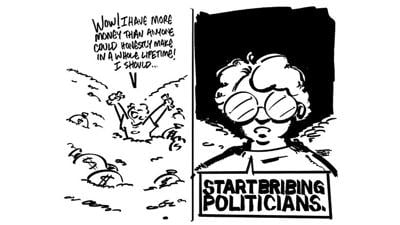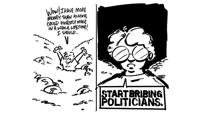Have you ever thought about what you’d do with your life if you found yourself wildly wealthy? I mean, who hasn’t?
At Leader World Headquarters, we start taking up a collection to buy lotto tickets when the payout gets high enough and spend our afternoon “walk to avoid death” chatting about what we’d do with a billion dollars.
We talk about the vacations we’d go on; the new homes we’d buy; and the debt we’d pay off for ourselves and family members. Heck, even buying a big new fancy microwave for the break room was mentioned. Dream big.
But never did a single one of us say, “Gee, I’d love to take a billion dollars to bribe politicians to change the tax code so I could have even more money at the expense of everyone poorer than me.”
To most normal people, that sounds insane. Why use your one life fighting to get more wealth when you already have more money than you could possibly spend in 100 lifetimes? Why spend time plotting in back rooms with lobbyists and oily politicians when instead you could be sipping champagne while getting a foot massage at every natural wonder the world has to offer?
I would think that most normal people dream of having a life of financial ease while following their passions, not plotting ways to try to make other people’s lives worse. Some might even dream of using a potential vast wealth to improve the lives of others.
But that doesn’t seem to be the priority for many of the richest people in this country. They have everything anyone could ever dream of and yet they want more – more profits; more tax breaks; more government subsidies and contracts; more power.
Something many people fail to realize is just how big a billion is. I once read this quote that seemed too extreme to be true, but it is:
“If you made $10,000 every day since the signing of the Declaration of Independence on August 2, 1776, you still wouldn’t have $1 billion.”
The math on that checks out. If you take $10,000 a day times 365 days it is $3,650,000 per year. If you multiply that times 249 years, you get $908,850,000. Elon Musk, the richest man in the world, is worth $419.5 billion. To make that much money, you’d have to make $10,000 a day for more than 114,931 years.
And what has Musk done to help his fellow man with that unfathomable wealth? Where are the Elon Musk libraries? Where are the Musk hospital wings or free health clinics? Where are the Musk disease and cancer research centers? Where are the Musk food banks and homeless shelters? Where are the Musk grants and scholarships?
Do you remember that time Musk tweeted that he was personally going to see to it that the water crisis in Flint, Mich., was fixed? “Please consider this a commitment that I will fund fixing the water in any house in Flint that has water contamination above FDA levels. No kidding.”
Could he afford to do that? Yes. Easily. Did he? No.
Or, do you remember that time when Musk tweeted that if anyone had a plan for how to end world hunger for $6 billion, he would fund it? Then, when UNICEF spent its time and energy coming up with a comprehensive plan to end world hunger for $6 billion because of that promise, Musk decided he didn’t want to fund it after all and instead bought Twitter. I certainly remember that.
But, I don’t mean to pick on poor little Elon. Plenty of other billionaires are just as miserly. Pick any billionaire who is currently trying to unduly influence the government, and you’re nearly guaranteed to find a person who has rarely thought of helping someone other than himself.
I recently watched the Hobbit movies and noticed the part where the dragon, Smaug, is sitting on a mountain of gold and hisses that he will not part with one single coin. After defeating Smaug, Thorin Oakenshield echoes the same sentiments, showing signs of “dragon sickness,” which causes illogical, greedy and violent behavior.
The audience understands this behavior to be a bad thing. It seems like a no-brainer that we don’t cheer for greedy, miserly characters, like Ebenezer Scrooge in “A Christmas Carol” or Mr. Burns from “The Simpsons.” Why is it so easy to see fictional greed as bad, but not real-life greed?
Being a billionaire is a form of hoarding. If these people were hoarding physical items the way they are wealth, we’d all easily identify it as a mental illness. If someone had a billion dollars’ worth of Beanie Babies, we would say the person needs serious therapy. But if we see somebody with $10 billion crying for tax cuts while their neighbors are starving, we often call the person a savvy businessperson.
Forbes magazine estimated Smaug’s mountain full of gold would be worth about $51.4 billion. Even with an entire mountain of gold, Smaug would only rank as the 18th wealthiest American.
Tom Anderson, known as “Myspace Tom,” sold Myspace for $580 million in 2005. Have you seen Tom trying to pull the levers of government to increase his wealth since then? No, because he’s a sane person who moved to Hawaii and spends his time on travel photography and surfing.
MacKenzie Scott, co-founder of Amazon and ex-wife of Jeff Bezos, signed a charitable-giving pledge in 2019 to give away most of her wealth to charity over her lifetime or in her will. Since then, she has donated more than $19 billion to charities in areas such as economic security, job stability, housing affordability, health care, child development and post-secondary education. Her current net worth is about $31 billion.
Dolly Parton, whose net worth is a paltry half-billion, started the Imagination Library to provide children around the world with free, high-quality, age-appropriate books each month because her own father couldn’t read or write. The program gifts over 2.4 million books for free every month.
Andrew Carnegie spent 90 percent of his fortune creating more than 3,000 libraries worldwide because a free library was how he gained the education to become wealthy.
We don’t need another Musk, Zuckerberg, Bezos, Murdoch, Thiel or Koch. We need more Dolly Partons, Andrew Carnegies, MacKenzie Scotts, or, at the very least, Myspace Toms.




